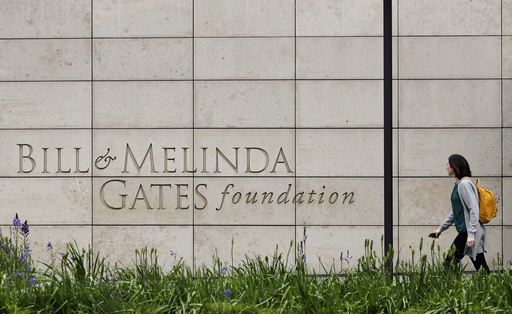Gates Foundation CEO urges billionaires to give more and soon

A person walks by the headquarters of the Bill and Melinda Gates Foundation on April 27, 2018, in Seattle. The CEO of the Bill & Melinda Gates Foundation, Mark Suzman, called on billionaires to give away more of their money to address inequality and to do it soon in an annual letter released Thursday, Jan. 25, 2024. AP FILE PHOTO
The CEO of the Bill & Melinda Gates Foundation has a message: Hey billionaires, give away more of your money to address inequality and do it soon.
Mark Suzman made the call in his annual letter released Thursday that led with the story of Chuck Feeney, a billionaire whose philanthropy inspired Warren Buffett, Bill Gates and Melinda French-Gates. Feeney, who died in October, made a fortune through duty free stores and gave away $8 billion during his life, much of it anonymously.
“He showed us all how the actions of one generous person can set the wheels in motion for generations of progress,” Suzman wrote of Feeney.
The message is a familiar one from the Gates Foundation, one of the largest global health funders in the world. The foundation recently announced it would spend $8.6 billion in 2024, its largest budget to date, aided by a $20 billion donation by Gates in 2022.
READ: Gates Foundation funds $40M for African mRNA vaccine development
The record-setting budget coincides with the erosion of progress nonprofits made toward ending poverty, fighting treatable diseases and eradicating hunger. Experts say the backsliding is caused by the pandemic, the war in Ukraine and high debt levels in many low- and middle-income countries.
“We are doing exactly what my call to action is,” Suzman said in an interview with The Associated Press. ”At a time of great need, if there is an opportunity to expand our giving, we should be modeling what that looks like.”
The foundation’s appeal builds on the Giving Pledge, which was launched by the Gateses and Buffett in 2010 as a commitment for billionaires to donate the majority of their wealth. Donors may give while they are alive or at the time of their death and to any cause.
Suzman noted that Feeney joined the pledge in 2011, adding, “I know that very few people are willing or able to give away all their wealth. But there’s a lot of ground between Feeney’s blockbuster generosity and the current state of giving among the ultra-wealthy—and so many opportunities to make an impact.”
At least one pledger, the billionaire investor Leon Cooperman, would like to see the pledge go further. In an interview in December, Cooperman told Ari Melber, MSNBC’s chief legal correspondent, that “the Giving Pledge is a notable idea, it makes sense but it’s not asking for enough.”
The foundation and Suzman lean toward optimism, pointing toward research and programs they’ve helped develop such as low-cost interventions that could decrease maternal and infant mortality and a global agricultural information system that would serve the world’s poorest farmers.
The Gates Foundation itself plans to increase its annual budget to $9 billion next year, and then hold at that level. The foundation board approved this year’s budget but asked the foundation to consider how to sustainably fund its work when the budget stops expanding, Suzman said.
“They’re pushing us to say, ‘Would you actually potentially sunset or shift some programs and what does it look like to keep more powder dry against potential opportunities?’” he said.
READ: Warren Buffett resigns from Gates Foundation, has donated half his fortune
The Associated Press receives financial support for news coverage in Africa from the Bill & Melinda Gates Foundation.
Groups aligned with the effective altruism movement, like Longview Philanthropy, also regularly call for even those with a small amount of wealth to give 10% to charities. In September, they issued a report on what could be accomplished if the top 1% of earners gave away 10% of their income.
“A lot of the conversation talks about it as a responsibility and maybe outrage that donors aren’t giving more, donors aren’t giving more effectively,” philanthropist Cari Tuna, president of the funder Open Philanthropy and wife of Facebook co-founder and current Asana CEO Dustin Moskovitz, said at an online panel about the report.
“But what seems most effective at least in my one-on-one conversations is really leading with the opportunity and sharing the excitement that we feel and why we find it so rewarding,” she said.
Suzman said he personally supports requiring U.S. philanthropic foundations to donate more than the currently mandated equivalent of 5% of their endowment. The Gates Foundation annually donates closer to 10% of its endowment, Suzman said.
Complicating the billionaires’ task is the fact that many keep getting richer. A report from Oxfam International, released during the World Economic Forum’s annual meeting in Davos, Switzerland, this month found that the fortunes of the world’s five richest men have doubled since 2020 and that the increasing concentration of wealth could yield the first trillionaire in the next decade.
Beyond that, a growing portion of charitable dollars in the U.S. go to donor-advised funds (DAFs), which allow donors to immediately claim a tax advantage. However, there is no deadline for when the funds in a DAF must be given to charitable causes.
Chuck Collins, a director at the Institute for Policy Studies who has studied the giving of billionaires, said giving to intermediaries like DAFs is one way the wealthiest donors keep control of charitable funds, instead of giving the money to nonprofits.
“These are our tax dollars at work and the donors are getting substantial tax reductions in the year they give,” Collins said. “So we should know how these funds are being deployed and if they are being deployed in a timely way.”